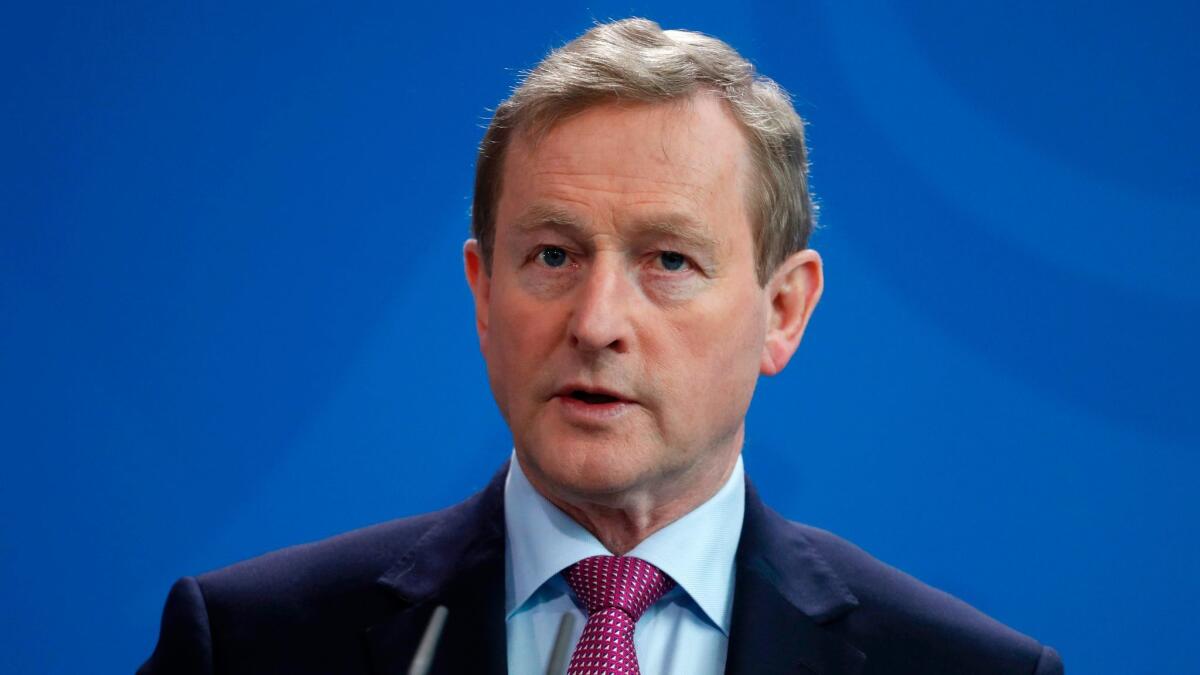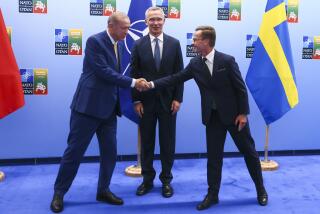European Union leaders may welcome a united Ireland after Britain’s departure via Brexit

Reporting from Brussels — European Union leaders are poised to support allowing Northern Ireland, if it unites with Ireland, to automatically become part of the multi-nation bloc after Britain’s departure via Brexit.
Leaders of 27 EU nations attending a Saturday summit in Brussels plan to confirm their positions favoring a motion by Ireland, an EU member, to allow Northern Ireland, which is part of Britain, to remain in the group.
Irish Prime Minister Enda Kenny has said he wants the final deal on Britain’s exit from the EU to guarantee that if Ireland and Northern Ireland unite, Northern Ireland would bypass the lengthy process for a country to join the EU.
The deal should guarantee that “at some future time, whenever that might be, if it were to occur, that Northern Ireland would have ease of access to join as a member of the European Union again,” Kenny told reporters during a February visit to the European Commission, the EU’s executive branch in Brussels.
Kenny pointed to the former East Germany, which he said followed a “seamless” process to immediately become a member of the EU when it reunited with West Germany in 1990.
Though negotiations between Britain and the EU are expected to last two years and cover many topics, including trade and immigration, Ireland’s position apparently generated strong backing going into the Brussels summit Saturday.
German Chancellor Angela Merkel this week said the 27 EU nations negotiating with Britain were united behind Ireland.
“There are many special interests, if we just think of the Republic of Ireland and its shared space with Great Britain and the problems in Northern Ireland,” Merkel said during a speech in the Bundestag, Germany’s lower house of parliament. “That’s why it was a good accomplishment to stick together like this.”
British Prime Minister Theresa May, meanwhile, has promised to make Ireland one of her main priorities as she negotiates Britain’s break from the EU. May has described avoiding a “hard border” with Ireland — which would mean checkpoints or passport controls.
The 310-mile border between Ireland and Northern Ireland is the only land boundary between Britain and Europe.
The sectarian conflict in Northern Ireland known as the “Troubles” that began in 1968 involved Protestants loyal to Britain and Catholics who wanted a united Ireland. More than 3,600 people died and 40,000 were wounded.
The hostilities ended with the 1998 Good Friday agreement, which among other things allowed travelers to go back and forth between the countries without checks.
Britain has “an important responsibility to make sure that nothing is done to jeopardize the peace process in Northern Ireland, and to continue to uphold the Belfast Agreement,” May wrote in a letter last month to Donald Tusk, the president of the European Council.
Michel Barnier, the EU’s chief negotiator for Brexit, said in March that the group will be “particularly attentive” in the talks “to anything that may, in one way or another, weaken dialogue and peace” in Ireland.
If and when Ireland and Northern Ireland might unite remains unknown, considering that so-called Brexit negotiations between Britain and the EU are expected to run into 2019.
In Britain’s June 2016 referendum on whether to remain in or leave the EU, voters in Northern Ireland favored remaining 56% to 44%. But the overall result for Britain’s voters was 52% to 48% to leave.
The minutes of Saturday’s summit are to include a paragraph stating that a united Ireland would be an EU member.
The reference to a united Ireland reflects months of the Irish government’s lobbying efforts. Kenny has traveled to Brussels and several European capitals to convince other leaders that the Brexit agreement must guarantee an invisible border in Ireland and close trade links to the United Kingdom.
Tusk, in a letter Friday to leaders of EU countries, named Ireland as one of three top priorities that “must come first” in the Brexit negotiations. Others include the rights of citizens and the money Britain will need to pay the EU before it leaves — more than $60 billion, according to some estimates.
Stupp is a special correspondent.
More to Read
Sign up for Essential California
The most important California stories and recommendations in your inbox every morning.
You may occasionally receive promotional content from the Los Angeles Times.










